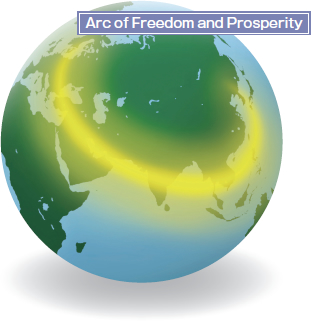1 A New Pillar for Japanese Diplomacy: Creating an Arc of Freedom and Prosperity
On November 30, Minister for Foreign Affairs Aso Taro delivered a policy speech entitled “Arc of Freedom and Prosperity: Japan's Expanding Diplomatic Horizons.”
In his address, Minister Aso announced a new vision, which adds another pillar of Japanese diplomacy to the existing pillars of reinforcement of the Japan-US alliance, international cooperation, most notably under the auspices of the United Nations, and enhancing relationships with neighboring countries such as China, the Republic of Korea (ROK), and Russia. This new pillar of Japanese diplomacy involves placing emphasis on universal values such as freedom, democracy, fundamental human rights, the rule of law, and the market economy and creating an Arc of Freedom and Prosperity.
This Arc would start from Northern Europe and traverse the Baltic states, Central and South Eastern Europe, Central Asia and the Caucasus, the Middle East, and the Indian subcontinent, then cross Southeast Asia finally to reach Northeast Asia. Here, a region of stability and plenty with its basis in universal values -the Arc of Freedom and Prosperity-would take shape, and indeed it is just such a region that this initiative seeks to create.
In order for each individual to lead a life of peace and happiness, it is crucial that there be the protection of freedom and fundamental human rights as well as the establishment of a market economy through a system that features both democracy and the rule of law. It is only when citizens are free that political stability and economic prosperity will come to last. The path Japan traveled in the 60 years since the end of World War II demonstrates this plainly.
In the years to come, as one element of its diplomatic policy, Japan will work to create this Arc of Freedom and Prosperity by facilitating the attainment of universal values. It will do so without forcing these values on any nation or people, and it will do so without seeking regime changes. Instead, Japan will pursue this goal maintaining a balance between political stability and economic prosperity and always giving full regard to each country's unique culture, history, and level of development.

In concrete terms, Japan will be acting in partnership with other nations that share our fundamental values to jointly bring about a society characterized by both freedom and prosperity by cooperating in the areas of trade and investment as well as by making use of official development assistance to provide support for basic human needs such as health care and education, support to enable democracy to take root, and support to enhance infrastructure and legal frameworks. This will be one of the critical building blocks of the Arc of Freedom and Prosperity and will furthermore contribute to the realization of “human security” that Japan has been advocating.
To examine this Arc from the east, ASEAN (the Association of Southeast Asian Nations) has been developing as the growth center of the globe, making steady progress in democratization and working towards intraregional stability through regional integration. Japan will be enhancing its support to ASEAN so that it can become part of the Arc of Freedom and Prosperity as the CLV nations (Cambodia, Laos, and Vietnam), which joined ASEAN later in the organization's history, themselves become able to take full advantage of these changes occurring in the other ASEAN member countries. Japan will also be actively supporting efforts towards democratization and peacebuilding in Nepal and other countries in South Asia.
In Europe, democracy has emerged in such countries as Poland, Hungary, the Czech Republic, Bulgaria, and Romania since the 1990's. At present the Baltic States and newly democratic countries participating in the regional cooperation groupings of GUAM (Georgia, Ukraine, Azerbaijan, Moldova) and the CDC, the Community of Democratic Choice are making efforts towards both democratization and the establishment of market economies. Japan actively supports these efforts.
The countries of Central Asia (Kazakhstan, Uzbekistan, Kyrgyzstan, Tajikistan, Turkmenistan) have been making gradual progress towards democratization and market economies since their independence from the Soviet Union. Japan will be providing support, keeping the specific conditions of each country in mind, and also, under the framework of the “Central Asia plus Japan” Dialogue, support self-sustaining development through the promotion of open regional cooperation, with a view to possible expanded regional cooperation with Afghanistan and perhaps Pakistan, to develop transportation and shipping routes that connect inland areas with the sea.
In creating an Arc of Freedom and Prosperity, cooperation with the United States, our ally with whom we share both values and strategic interests, is a given. It is also critically important that Japan strengthen its relationship with other countries and entities with whom it shares values, namely Australia and India as well as the G8, other nations in Europe and the European Union (EU), and the North Atlantic Treaty Organization (NATO). Japan will be working in close cooperation with them into the future. In the east are Japan, the United States, and Australia; in the center lies India; to the west are the EU and NATO. The basic form of the Arc of Freedom and Prosperity will result from expansions from those points around the rim of the Eurasian continent. Yet this fundamental concept underlying this Arc of Freedom and Prosperity -that is, the creation of a society of stability and plenty having universal values as its foundation- should not be limited to only these areas. On the contrary, this concept is one that should also be shared with China, Latin America, and Africa.
There already exist fora through which Japan can hold policy discussions with many of the countries found along this Arc of Freedom and Prosperity. In the years to come, Japan will make efforts to intensify such policy discussions while also building up its dialogues with countries with whom frameworks for discussion are lacking or weak, such as the CLV countries, the V4 countries (Visegrad Four: the Czech Republic, Hungary, Poland, Slovakia), and the GUAM states.